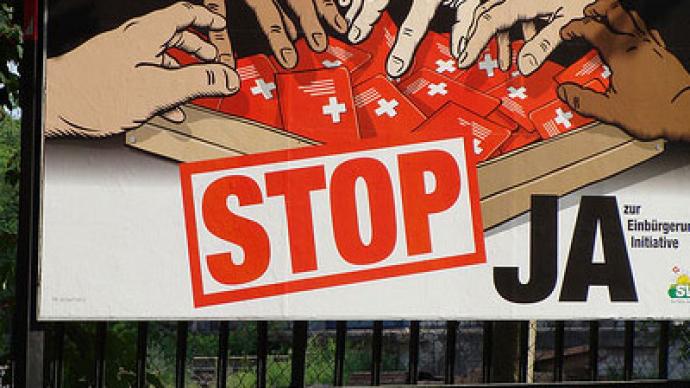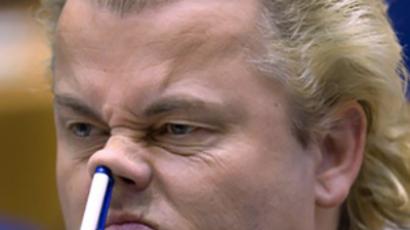Swiss made only, please

The people of Switzerland have approved a proposed law to expel foreign criminals from the country.
The nationwide ballot was initiated by a right-wing party.Switzerland, which has one of Europe's largest immigration populations, may be reversing its friendly policies in order to protect the locals.Two years ago, 22-year-old Damiani Tamagni’s life was brutally cut short.“My son was at the carnival with his friend,” Damiani’s father, Maurizio Tamagni, told RT. “He was just standing and having a conversation when three young men came toward him and started beating him with their fists. They hit his head, beat him until he fell and then started kicking him. They beat him to death for no reason. No reason at all. They did it just for fun.”When details emerged, the attackers of the Swiss national appeared to be from the Balkans.Anti-immigrant sentiment rose, giving traction to a referendum proposal to make it mandatory for foreign criminals charged with serious crimes, such as murder or rape, to be kicked out of the country.Just a year after voting in favor of a law banning the building of new minarets on mosques, the Swiss are set to return to the polls on Sunday with another “yes” or “no” decision to make.“A lot of people should no longer be in Switzerland because they don’t deserve to be in Switzerland… Some people, they get so much money, I mean, they are acting like criminals. We can no longer accept them,” a Zurich local told RT.“Ten percent of the population is born in Switzerland and doesn’t have a Swiss passport and you want to kick these guys out?”, said another. “I mean, come on, it’s ridiculous.”Ulrich Schluer, a member of the Swiss People’s Party, which initiated the referendum, is adamant that the answer should be “yes.”“People with a serious criminal career, there is no place for them in Switzerland,” he said. “That is the idea. We have growing criminality in Switzerland. We certainly have too many foreign criminals here, and we do not want to accept that.”It is a sensitive statement to make in a country where more than a fifth of the population are immigrants, one of the highest percentages in Europe.Wary of a backlash from the EU and the world, the Swiss parliament released a “counter proposal” with amendments to the list of crimes and provisions stating that deportations must fall within both Swiss and international law.Still, either version is seen by some as another anti-immigration move, adding to what has been dubbed a rising wave of anti-immigration sentiment sweeping across the country and Europe in general.
Last year the country voted to ban the construction of new minarets.“Can you draw a difference between a drug dealer who is from Nigeria, Russia, India or Switzerland?”, asked Yahya Bajwa, a Green Party member of the Provincial Assembly of Argao. “Is a Swiss drug dealer a better one? I don’t draw a difference between someone who is doing something wrong. The law should not look whether he is brown, black or white.”For Maurizio, the debate is a personal one. He prefers not to divulge his vote, but does say this: “I respect everyone’s differences. Foreigners who come to Switzerland, they should also respect our laws.”On the one hand, the very idea of a proposed law targeting immigrants has raised accusations of racism and intolerance. But could it also be a way of saying that even tolerance has its limits? No matter what the outcome of the Swiss referendum vote, many European nations will continue to face such tough questions, the answers to which may keep boiling down to a “yes” or a “no.”














